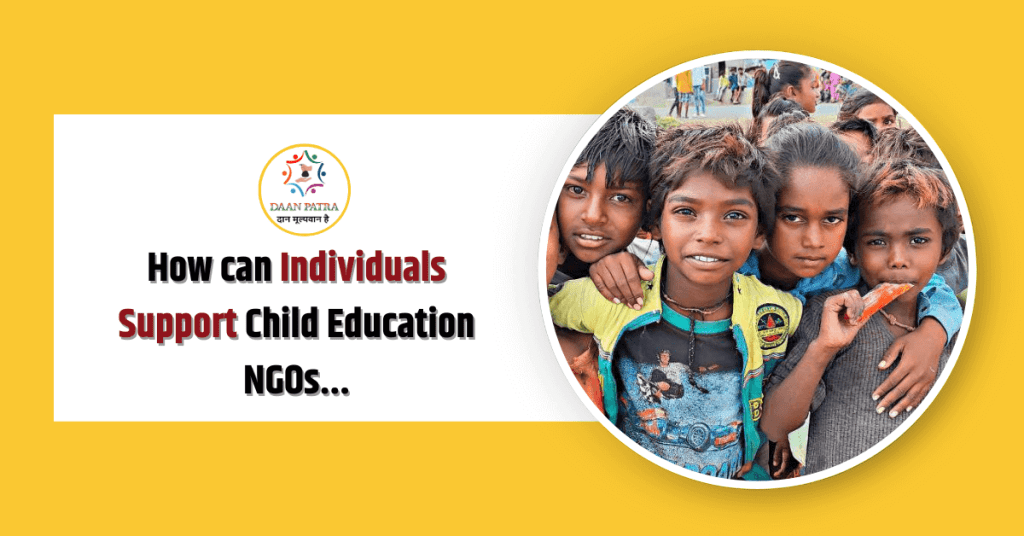The right to education is a fundamental human right, yet millions of children across the globe face barriers to accessing it. This is where child education NGOs step in, working tirelessly to bridge the gap and empower children through knowledge. But their mission can only succeed with the support of individuals like you. So, how can you step up and make a difference in the lives of these children?
Financial Contributions
- Direct Donations: This is the most straightforward way to support an NGO. Every bit counts, whether it’s a one-time contribution or a recurring monthly donation. Choose an NGO that aligns with your values and interests, and make a secure online donation.
- Sponsor a Child: Many NGOs offer child sponsorship programs, where you can directly support the education of a specific child. You can receive updates on their progress and build a personal connection with the impact you’re making.
- Fundraising: Organize a bake sale, a charity run, or an online campaign to raise money for an NGO. Get your friends and family involved and spread awareness about the cause.
Volunteering Your Time
- Teaching and Mentoring: Share your skills and knowledge by volunteering as a tutor or mentor. You can teach language, math, computer skills, or even life skills. This can be done in person or virtually, depending on your availability and the NGO’s needs.
- Administrative Support: NGOs often need help with administrative tasks like data entry, organizing events, or managing social media. Offer your skills and contribute to the smooth running of the organization.
- Advocacy and Awareness: Raise your voice and advocate for the rights of children to education. Contact your local representatives, write letters to the editor, or participate in rallies and marches. Spread awareness about the challenges faced by children in accessing education and the incredible work done by NGOs.
Creative and In-Kind Support
- Donate Books and Supplies: Schools in underprivileged communities often lack basic resources. Donate books, stationery, school bags, or uniforms to children in need. You can organize book drives in your community or partner with local businesses to collect supplies.
- Skill-Sharing Workshops: Share your expertise by conducting workshops on topics like digital literacy, financial literacy, or career guidance. This can empower children with essential skills for their future.
- Organize Educational Activities: Organize fun and educational activities for children, such as field trips, movie nights, or reading clubs. These activities can spark a love for learning and make education more engaging.
Beyond the How: Key Considerations
- Research and Choose Wisely: Do your research before supporting an NGO. Look for transparency in their financials, impact reports, and beneficiary stories. Choose an organization that aligns with your values and has a proven track record of success.
- Stay Connected: Once you’ve chosen an NGO to support, stay connected and engaged. Volunteer your time, attend events, and share their work with your network. Your ongoing support is crucial for their long-term success.
- Spread the Word: Talk to your friends, family, and colleagues about the importance of child education and the work of NGOs. Encourage them to get involved and make a difference.
Frequently Asked Questions
Q1. How can I find child education NGOs in my area?
Ans. Many online platforms like Give.do, Guidestar, and Charity Navigator list and review NGOs. You can also check with your local community center or library for recommendations.
Q2. What if I don’t have much time or money to volunteer?
Ans. Every contribution, big or small, makes a difference. You can share information about the NGO on social media, write a letter to the editor, or simply raise awareness among your friends and family.
Q3. How can I be sure my contributions are reaching the children in need?
Ans. Choose an NGO that is transparent about its finances and activities. Look for independent audits and impact reports that demonstrate how your contributions are being used.


I have a great command of sophisticated language and literature because I am an artist at heart as well as a writer by profession. I am able to constantly produce work of a high quality because of my knowledge. I’m well-known for my versatility and am an excellent writer of both creative and technical content. To write content that is both entertaining and customized, I take the approach of getting to know the interests and preferences of my targeted audience.

